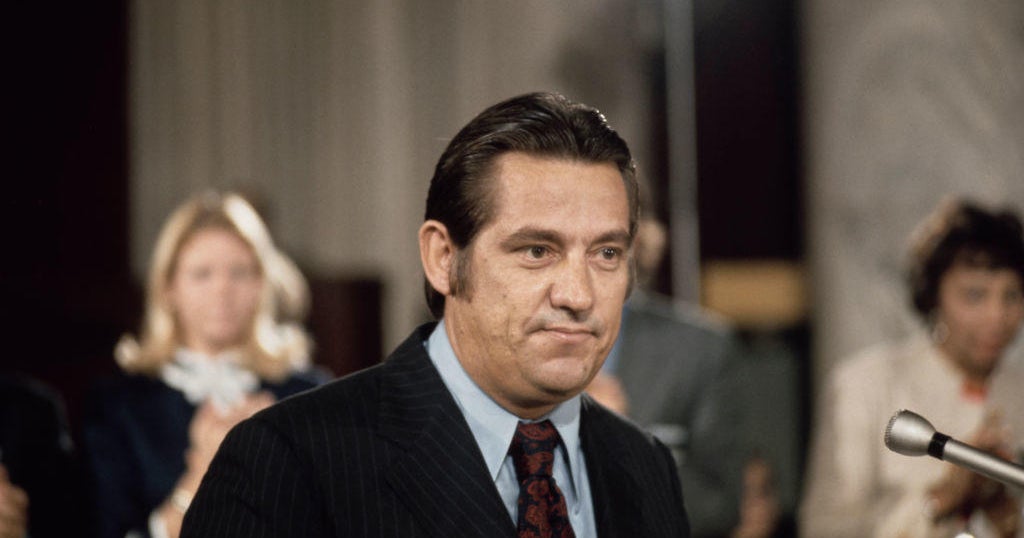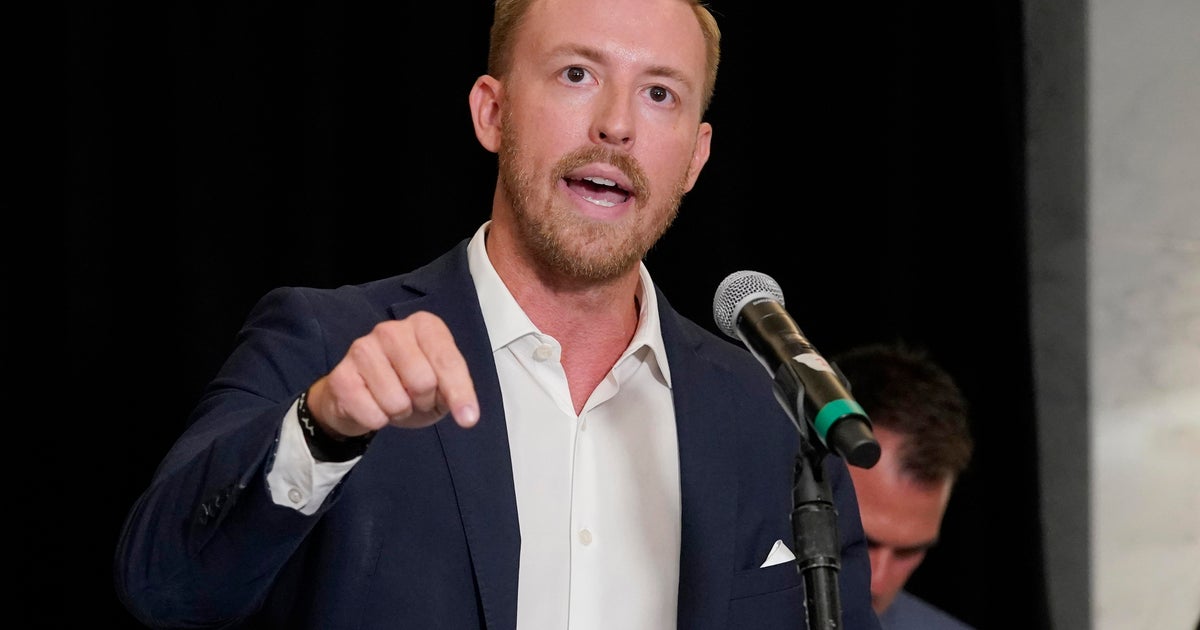CBS News
Oklahoma moves toward final U.S. execution of 2024 after clemency plea rejected

An Oklahoma panel on Friday rejected a plea for clemency for a man convicted of torturing and killing a 10-year-old girl as part of a cannibalistic fantasy, paving the way for him to become the 25th and final person executed in the U.S. this year.
Three members of Oklahoma’s Pardon and Parole Board voted unanimously against clemency for Kevin Ray Underwood, who is scheduled to receive a lethal injection on Thursday, his 45th birthday. An Indiana man, Joseph Corcoran, is set to die Wednesday for killing four men in 1997 in what would be the Hoosier State’s first execution in 15 years.
Underwood was convicted of killing 10-year-old Jamie Rose Bolin in 2006. The girl was a neighbor at his Purcell apartment complex who Underwood admitted to luring into his apartment and beating her over the head with a cutting board before suffocating her to death.
Underwood admitted to investigators in a videotaped confession played to the board on Friday that the killing was part of a cannibalistic fantasy and that he nearly beheaded the girl in his bathtub before abandoning his plans to eat her.
“I would like to apologize to the victim’s family, to my own family and to everyone in that room today that had to hear the horrible details of what I did,” Underwood said to the board via a video feed from the Oklahoma State Penitentiary. “I can’t believe I did those things. The person I was in the weeks leading up to that event is not who I am now.”
Underwood’s attorneys argued that he deserved to be spared from death because of his long history of abuse and serious mental health issues that included autism, obsessive-compulsive disorder, bipolar and panic disorders, post-traumatic stress disorder, schizotypal personality disorder and various deviant sexual paraphilias.
His mother, Connie Underwood, tearfully asked the board to grant her son mercy.
“I can’t imagine the heartache the family of that precious girl is living with every single day,” Connie Underwood said. “I wish we understood his pain before it led to this tragedy.”
Assistant Attorney General Aspen Layman urged the board to reject clemency, calling Underwood’s crime “one of the most notorious and depraved murders in Oklahoma history.”
“Mr. Underwood chose Jamie because he thought that she was small and defenseless and easy prey,” Layman said. “And while we, as an enlightened society, can give grace to those struggling with mental illness, we can still expect them to refrain from planning the murder, rape, torture and cannibalism of 10-year-old little girls.”
Several members of Bolin’s family asked the board to reject Underwood’s clemency bid. The girl’s father, Curtis Bolin, was scheduled to testify to the board but became choked up as he held his head in his hand.
“I’m sorry, I can’t,” he said.
Underwood is scheduled to receive a three-drug lethal injection Thursday inside the death chamber at the Oklahoma State Penitentiary in McAlester. It would be Oklahoma’s fourth execution of the year and the 25th nationally if both his and Corcoran’s are carried out next week.
CBS News
Meet the stars of “Dexter: Original Sin”

Watch CBS News
Be the first to know
Get browser notifications for breaking news, live events, and exclusive reporting.
CBS News
NFL legend Randy Moss reveals cancer diagnosis, surgery

MINNEAPOLIS — After announcing that he was stepping away from broadcasting earlier this month, NFL Hall of Fame wide receiver Randy Moss informed fans Friday that he has been diagnosed with cancer.
In an Instagram livestream Friday afternoon, Moss told fans worried about his health that he’s a “cancer survivor.” He disclosed that he spent six days in the hospital and underwent surgery. He thanked his team of doctors and all those who prayed for him.
“I am a cancer survivor,” Moss said. “Some trying times, but we made it through.”
Moss said doctors found cancer in the bile duct “right between the pancreas and the liver.”
“I didn’t think I would ever be in this position, as healthy as I thought I was,” he said.
Andy Clayton-King / AP
Moss, 47, stepped away from his broadcasting role at ESPN earlier this month, with the network citing a “personal health challenge” as the reason.
The Minnesota Vikings legend first revealed his health issues to fans on Instagram on Dec. 1, saying he “has been battling something internal” and asking for prayers.
Since then, Moss has received an outpouring of support from media colleagues, former players and the Vikings organization.
“I just want to, on behalf of the whole Minnesota Vikings organization, just send him our well wishes and support,” Vikings head coach Kevin O’Connell said. “We love Randy and know our fanbase feels the same way.”
Moss played 14 seasons in the league with the Vikings, New England Patriots, Oakland Raiders, Tennessee Titans and San Francisco 49ers and is fourth all-time in receiving yards (15,292) and second in receiving touchdowns (156). He retired in 2012, joined ESPN in 2016 and entered the Pro Football Hall of Fame in 2018.
CBS News
Georgia judge denies motion to overturn guilty plea from former Trump lawyer in election interference case

A Georgia judge has rejected former Trump campaign campaign lawyer Kenneth Chesebro’s push to invalidate his guilty plea in the Fulton County election interference case.
Chesebro was one of 19 defendants charged in the August 2023 indictment accusing former President Trump and others of trying to illegally overturn his 2020 election loss in Georgia.
Chesebro pleaded guilty in October 2023 to a conspiracy to file false documents charge. He was sentenced under Georgia’s First Offender Act, which allows the charge to drop off his record if he successfully completes probation with no violations.
Earlier this month, Chesebro’s attorney asked Fulton County Superior Court Judge Scott McAfee to throw out the plea after he dismissed the charge Chesebro pleaded guilty. His attorneys argued the plea should be thrown out because it violates his rights to due process.
But McAfee dismissed the motion calling it, “procedurally defective in more ways than one.” He noted that Chesebro “has already submitted a plea in response to this indictment — one of guilt.”
He also said that Chesebro’s motion was not a “valid motion in arrest of judgment” — Chesebro was calling on McAfee to stop the judgment because of a defect. McAfee pointed out that under the First Offender Act, Chesebro had pleaded guilty before “an adjudication of guilt” and “without entering a judgment of guilt.” So, McAfee reasoned in the ruling, “No final judgment occurs ….Therefore, there can be no arrest of judgment here.”
The indictment accused Chesbro of proposing, in a memo to Trump allies, “a bold, controversial strategy” to overturn the election: appoint alternate electors loyal to Trump in several states.
This proposal and at least one other memo he penned were included in the Georgia indictment as overt acts “in furtherance of the conspiracy.” The seven original counts against him stemmed from the plan to submit a slate of fake electors from Georgia.
The Fulton County election interference case against the president-elect is on hold after the Georgia Court of Appeals temporarily halted the proceedings in June. The appeals court is reviewing a trial judge’s ruling that allowed Fulton County District Attorney Fani Willis to continue prosecuting the case if special prosecutor Nathan Wade resigned. Trump and several of his co-defendants sought to remove Willis from the case after it was revealed she had a romantic relationship with Wade. Trump and others accused Willis of improperly benefiting from the relationship, an allegation she denies.









